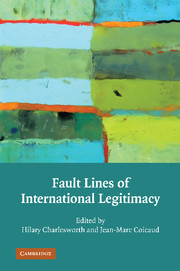Book contents
- Frontmatter
- Contents
- Acknowledgments
- Contributors
- Introduction
- PART I FROM THE HISTORY AND STRUCTURE OF INTERNATIONAL LEGITIMACY TO FAULT LINES IN CONTEMPORARY INTERNATIONAL POLITICS
- PART II THE UN SECURITY COUNCIL: EXPRESSION, VENUE, AND PROMOTER OF INTERNATIONAL LEGITIMACY?
- PART III LEGITIMACY OF INTERNATIONAL INTERVENTIONS AND HIERARCHY OF INTERNATIONAL RIGHTS
- 9 Cosmopolitan Militaries and Cosmopolitan Force
- 10 Sovereignty, Rights, and Armed Intervention: A Dialectical Perspective
- PART IV IN SEARCH OF NEW FORMS OF INTERNATIONAL LEGITIMACY: BETWEEN POWER AND PRINCIPLES
- Conclusion: The Legitimacies of International Law
- Index
- References
9 - Cosmopolitan Militaries and Cosmopolitan Force
Published online by Cambridge University Press: 06 April 2010
- Frontmatter
- Contents
- Acknowledgments
- Contributors
- Introduction
- PART I FROM THE HISTORY AND STRUCTURE OF INTERNATIONAL LEGITIMACY TO FAULT LINES IN CONTEMPORARY INTERNATIONAL POLITICS
- PART II THE UN SECURITY COUNCIL: EXPRESSION, VENUE, AND PROMOTER OF INTERNATIONAL LEGITIMACY?
- PART III LEGITIMACY OF INTERNATIONAL INTERVENTIONS AND HIERARCHY OF INTERNATIONAL RIGHTS
- 9 Cosmopolitan Militaries and Cosmopolitan Force
- 10 Sovereignty, Rights, and Armed Intervention: A Dialectical Perspective
- PART IV IN SEARCH OF NEW FORMS OF INTERNATIONAL LEGITIMACY: BETWEEN POWER AND PRINCIPLES
- Conclusion: The Legitimacies of International Law
- Index
- References
Summary
The contemporary system of international law and international political practice has come to be characterized by two patterns that now “live side by side.” Together, they provide an apparently settled understanding about the legal and legitimate deployment of force in international relations. The legal and political norms of the Westphalian order proscribe the use of force between states except in self-defense. Since the period immediately following World War II, another pattern – the so-called United Nations (UN) Charter model – has been superimposed on this older model. The collective security provisions of the UN Charter legitimate the use of multilateral force but only in defense of any member state under attack or, under Chapter VII, when the Security Council determines that there is a threat to or breach of international peace and security. Although it is not specifically stated in the UN Charter, such threats have been assumed to arise from military attack. All other “external” uses of military force and forces, therefore, are deemed illegal under both Westphalian and the UN Charter models of international law. A number of international-relations scholars, whose orientation falls within a broadly cosmopolitan framework, argue that military institutions now have a new role in the management of security crises through what has been variously described as “cosmopolitan law enforcement” and the “new military humanism.”
- Type
- Chapter
- Information
- Fault Lines of International Legitimacy , pp. 279 - 302Publisher: Cambridge University PressPrint publication year: 2010
References
- 1
- Cited by

